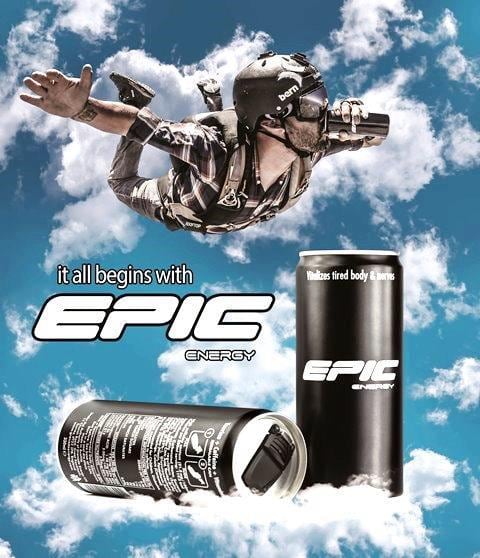CEO of the UK start-up, Omair Mateen, said the resealable can for its energy drink ‘Epic’ would encourage consumers to drink the caffeinated drink, which also contained taurine from synthetic sources, responsibly. He said this would mean consumers would not have to drink the entire 330ml portion - bigger than major competitor Red Bull, which sells traditional ring-pull cans of 250ml - in one go.
“Once you open the can you do not have the option of consuming it at a later stage –whether it’s a 250ml or 500ml you have to drink it is one go. Once you leave it for a while it becomes warm, or you’ve got the carbonation loss. So the resealablity is actually completely changing the dynamic because you don’t need to finish the can and take all the intake in one go,” he told NutraIngredients at the industry event SIAL in Paris this week.
Coca Cola’s Burn brand and Monster Energy also offer plastic top formats.
He added Epic would not be explicitly positioned as an alcohol mixer – 'vodka & Red Bull' drink suggestions were off the agenda - although bars, nightclubs and food services would still be targeted.
Inspired by confectionery?
Inspiration had been garnered from other industries like confectionery where portion control had become the “biggest priority”. Within this sector manufacturers sought to reduce sugar and fat intakes per portion by shrinking the size of products or offering individually wrapped servings within bigger packs.
Confectionery giant Mars even said that it had exhausted reformulation options, and portion control was now its only option. Meanwhile product pricing has not decreased with product size, according to our sister site ConfectioneryNews.
“What is happening is, for example in the snacks business, we’re having smaller portions, but in multipacks. Because people want to have smaller portions, they want to have the flexibility, but at the same time they want some option of control over those things as well.”
Epic contains 31.5 mg of caffeine per 100 ml serving, and o.4% taurine, similar to other energy drinks on-market (Red Bull contains 1 g of taurine).
Avoiding bad press in a saturated UK market
Epic is yet to launch into its highly competitive home market where brands abound but Red Bull reigns. “The UK is an extremely tough market to be in," Mateen said.
“It is an 850-million can market, but you’ve got one player – Red Bull – selling 450 million cans and then you have Monster and Relentless etc and then you have 40 other brands that are trying to get a share of the left over 10% of the market.”

He said success in this saturated environment required a lot of investment in marketing, so it decided to go to markets where less investment was required and try strategies like social media.
‘Bad press’ around energy drinks and health was another consideration.
“That was the primary reason we didn’t want to launch into the UK. Over the last few years there’s been extreme negative publicity associated with energy drinks.”
Meanwhile, the European Commission said that the stalled health claim on caffeine would be delayed again until April next year.
Navigating taurine and caffeine regulation
So far the firm had ventured into “simple” markets which were “smaller”, less saturated and did not have as many “legal issues” concerning caffeine and taurine consumption – having already launched in the Maldives, United Aran Emirates and Pakistan as testers with a smaller financial risk, he said.
In some markets in Asia Mateen noted there existed very strict regulation on energy drink formulation and marketing. “You have to either sell as a vitamin drink or a functional drink but they have legal issues regarding the caffeine content.”
“We haven’t had to reformulate yet, but for example for China we would be forced to reduce the caffeine and taurine content. China has its own regulations and they’re very, very strict on that.”
The firm's first priority was Africa, the Middle East, Central Asia, eastern Europe and China along with the rest of Europe.
